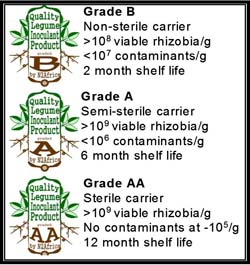|
In Kenya, efforts are undertaken to develop and implement registration guidelines for microbial products including rhizobium inoculants, assisted by the COMPRO II and N2Africa project. The draft bio-fertilizer act, in which requirements for bio-fertilizers is stipulated, is before parliament. Similarly in Nigeria and Ghana efforts are underway to establish regulatory guidelines for bio-fertilizers. The Rwandan Bureau of Standards (RBS) has requested N2Africa to develop standards for quality control purposes. N2Africa proposes standards for quality of inoculants to be adopted across countries in sub-Saharan Africa. Currently, none of the original eight countries targeted by N2Africa has regulations in place that specify requirements for the quality of inoculants, though several countries are in the process of establishing such regulatory framework.
|
Figure: The proposed grades and quality standards of legume inoculants under the N2Africa universal logo |
Using uniform quality criteria and grading system would help producers to set targets for the quality of their inoculants. Hopefully it would help speeding up the registration process, if procedures for registration could be relaxed if that product is already registered in another country. The requirements for registration in some countries are quite involving (like field testing in three consecutive seasons).
Three grades are proposed, permitting inoculant manufacturers to meet a minimal standard upon market entry and then recognize improvement in their product with time.
The grading system we propose encompass the different standards adopted in various countries. Argentina, Thailand and France have the lowest requirement of 1 x 108 rhizobia cells per g, whereas Brazil, Australia and Canada demand > 1 x 109 viable cells per g. The number of contaminants is important in specifying quality requirements as they determine the shelf life of the product. We included requirements regarding the maximum number contaminants in similar way reviewing the standards in various countries.
The three grades (B, A and AA) together with the proposed logo are presented in Figure 1. These inoculants are solid, prepared from an organic carrier and may either be finely powdered to < 300 nm mesh for application to seed or pelleted for application to soil. The corresponding shelf life would be 2, 6 and 12 months respectively, if stored under proper conditions.
Imposing quality standards requires also procedures for quality control. Laboratory procedures for quality testing have been described by Bala (2011) in N2Africa Report 019. N2Africa is pleased to advise on regulatory frameworks and is collaborating with the COMPRO II project in assisting various African countries to develop and implement their own regulations.
Paul Woomer and Jeroen Huising

